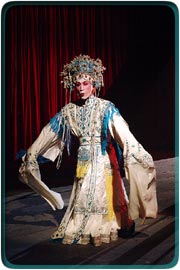






Also this issue: Taking the Stage Feast on Furniture Artquicks Wonders in Wood Day of the Poet The Importance of Being Earnest BigSmorgasbord WunderWerk Happy Alliance |
|||||||||
June 5-11, 2003
theater
See Red
 WHITE-HAIRED DAMSEL IN DISTRESS: Francis Jue stars as Hua Wai Mun. |
The Wilma production of Chay Yew’s rich and intense play, Red, is, in a word, magnificent. Under Blanka Zizka’s impeccable direction, three fine actors and four fine designers combine their talents to provide some splendid theater. A small part of what makes it so good is that it is genuinely surprising, which makes this a tricky review to write, since to reveal any of the clues leading up to the resolution would be to spoil your pleasure. Suffice it to say that all the stuff that you’ll be wondering about during intermission will be clarified by the end of Act II.
In Act I, a best-selling author, "the Asian Danielle Steele" who writes formulaic romance novels with titles like Bound Feet, Bound Lives, decides to return to her homeland. She arrives in Shanghai, finds an old abandoned theater and discovers the subject of her next book: Hua Wai Mun, former star of the Beijing Opera. As she interviews him, and then his protégé, Ling, the relationships among the three become more and more complex. All the human drama is played out on the political as well as the theatrical stage -- this is China, after all, in the 1960s when Mme. Mao, the wife of Chairman Mao, led the Cultural Revolution, which "purged" China of thousands of years of culture by burning books and commandeering theaters.
We see the vivid contrast between Ling, a young woman with braids in a severe Red Guard costume (and what else is a uniform but a costume in the world's political drama), and the young woman who is the central character of one of China's best-known operas, The White-haired Damsel, ornately gowned in brocade and jewels and a long white braid. This contrast is complicated by the fact that the damsel is played by a man, adding gender politics to the mix.
We are further asked to consider (although you don't consciously pause long enough to "consider" since the play is so engrossing) the collision not only between male and female but between old and young. All family drama is generational, but here that is made immensely important by the ideology of Communist China: The Red Guard was a youth army, shining young faces intoxicated by vicious power, committed to cleansing China of its antiquated ideas (including the patriarchal bias against women -- an idea fostered by the old operas, especially The White-haired Damsel). So the personal and the historical and the artistic merge in this extraordinarily ambitious play.
And then add theatricality to all this: Yew uses Chekhov and Brecht -- playwrights inhabiting opposite ends of the dramatic spectrum -- both symbolically and structurally. Red also demonstrates the way two different kinds of writing exert power on the mind: When Sonja narrates her story, we see it happening, even as our author is still there in the background -- exactly the theatrical representation of the act of reading a novel.
The actors are wonderful: Jade Wu as the novelist manages to give subtle depth to a character protected and defined by clichés and superficiality. Lydia Look is deeply moving as she slides from a sweet 10-year-old to a rebellious teenager, from violence to tenderness, and her tiny, lithe physical presence on stage makes you think she might actually fly (a la Crouching Tiger). Francis Jue, as Hua Wai Mun, is astonishing; whether he is paternal or theatrical, whether he is demonstrating the exquisite hand movements of traditional choreography or lying broken on the floor, he is always passionate and elegant.
Set designer Klara Zieglerova’s dilapidated theater onstage evokes a world both familiar and exotic, where the simplicity of the dressing table and two chairs echoes those same traditional elements in Beijing Opera sets. Russell H. Champa’s lighting is moody and clever in what it illuminates and what it hides; James Sugg’s sound design can wrap the audience in a shouting crowd or make us collectively hear a pin drop and Hiroshi Iwasaki’s costumes speak volumes.
Wilma has told us that their mission is to introduce us to playwrights who bring different cultural experiences alive on stage in hope of fostering human sympathy; Red does exactly that. --Toby Zinman
RED
Through June 22, The Wilma Theater, Broad and Spruce sts., 215-546-7824






